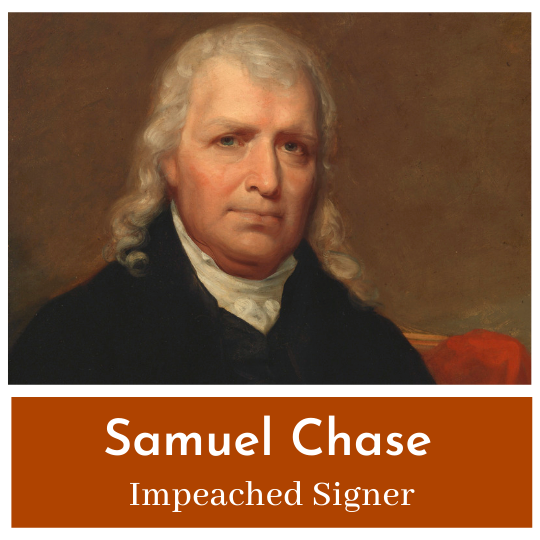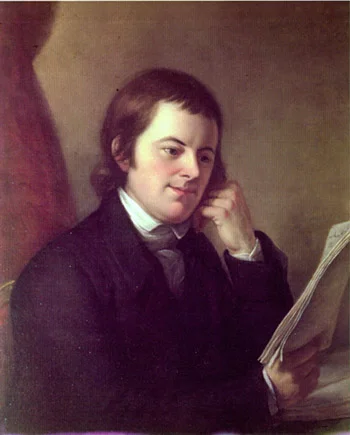Congress Impeaches Samuel Chase
Samuel Chase was an early revolutionary who signed the Declaration of Independence.
After disappearing from national politics for a while, Chase reemerged and was appointed by George Washington as a Supreme Court Justice who served until the Madison Administration.
Chase was eventually put on trial in an attempt to remove him from office, a case which had long lasting impact on the United States.
Samuel Chase
Samuel Chase was a brash Maryland attorney whose friends, for some unspecified reason, gave him the nickname ‘Old Bacon Face.’
As with many young men, he had energy, a foul mouth and the readiness to rebel against anything.
Fortunately for him, there was a Revolution being stirred up.
Continental Congress
Chase pushed the buttons of the Maryland elite and was selected by his constituents to the Provincial Assembly. The Assembly, in turn, sent him to the First Continental Congress and he signed the Continental Association.
The vocal Revolutionary was a supporter of separating from the Mother Country from the get-go and gladly signed the Declaration of Independence.
Unfortunately, Chase was removed from the Continental Congress in 1778 due to some shady business practices. He used insider knowledge about the Continental Army to try and monopolize the flour market in Maryland. Of course, this didn’t fly, and his reputation was severely wounded for the next couple of years.
Return To Form
Samuel was brought back into public life after the war’s end when he was sent to England to discuss Bank of England stocks and the repaying of debt to Loyalists who lost their belongings after leaving America.
When he returned, he was named as a judge in Baltimore. He became Chief Justice of the District Criminal Court for that city before being promoted to Chief Justice of the Maryland General Court.
Always a rebel, Chase was an outspoken Anti-Federalist during the debates over ratification of the Constitution. After the new government began, however, Samuel supported the strong leadership of President Washington. He became a major supporter of the Pro-Administration Party.
Supreme Court
In 1796, due to his support of the President and his history as an expert in the law, Samuel Chase was nominated as a Supreme Court Justice by George Washington. After his approval, he began speaking publicly about policy.
This wasn’t a problem until Thomas Jefferson became President.
When Jefferson won the election, the Democratic-Republicans simultaneously took over the majority in the House of Representatives. Claiming Chase had acted ‘indecent’ in some recent court cases (which involved members of the Whiskey Rebellion as well as people charged under the Alien and Sedition Acts), the House impeached Samuel.
Impeachment Trial
As is still the case, the impeachment meant that Chase would be given a trial in the Senate. If he lost the trial, he was out. This is the first (and to this day only) time a Supreme Court Justice has been impeached.
The trial was presided over by the head of the Senate, Vice-President Aaron Burr. Burr was fresh off killing Alexander Hamilton and technically a fugitive in New York, but by all accounts, he led a fair and impartial trial.
After proving that all of his decisions in court were based on precedent, Samuel Chase was acquitted of all charges. He continued on the Supreme Court until his death six years later.
Impact
The importance of this impeachment trial is that, at so early a point in America’s constitutional history, it had a profound effect on how the Supreme Court operates.
It demonstrated that Associate Justices, who are appointed for life, can not be removed flippantly as opinions change in the United States. This, in effect, help build the Supreme Court into its own, remote branch of the government.
Had Chase been impeached, just a decade and a half into the reign of the Constitution, it would have perhaps made the Supreme Court subservient to Congress. Therefore, Congress would have played a larger role in the history of Constitutional interpretation.
While Samuel Chase does not have a full biography written about him, there is an important study of his (and Andrew Jackson's) impeachment case written by recent Chief Justice William Rehnquist. If you'd like to learn more about Chase and his impact on separation of powers, this is the book. Our links bring you to our affiliate, Amazon.
Please don't forget to subscribe to our email list for a new Founder every day.






